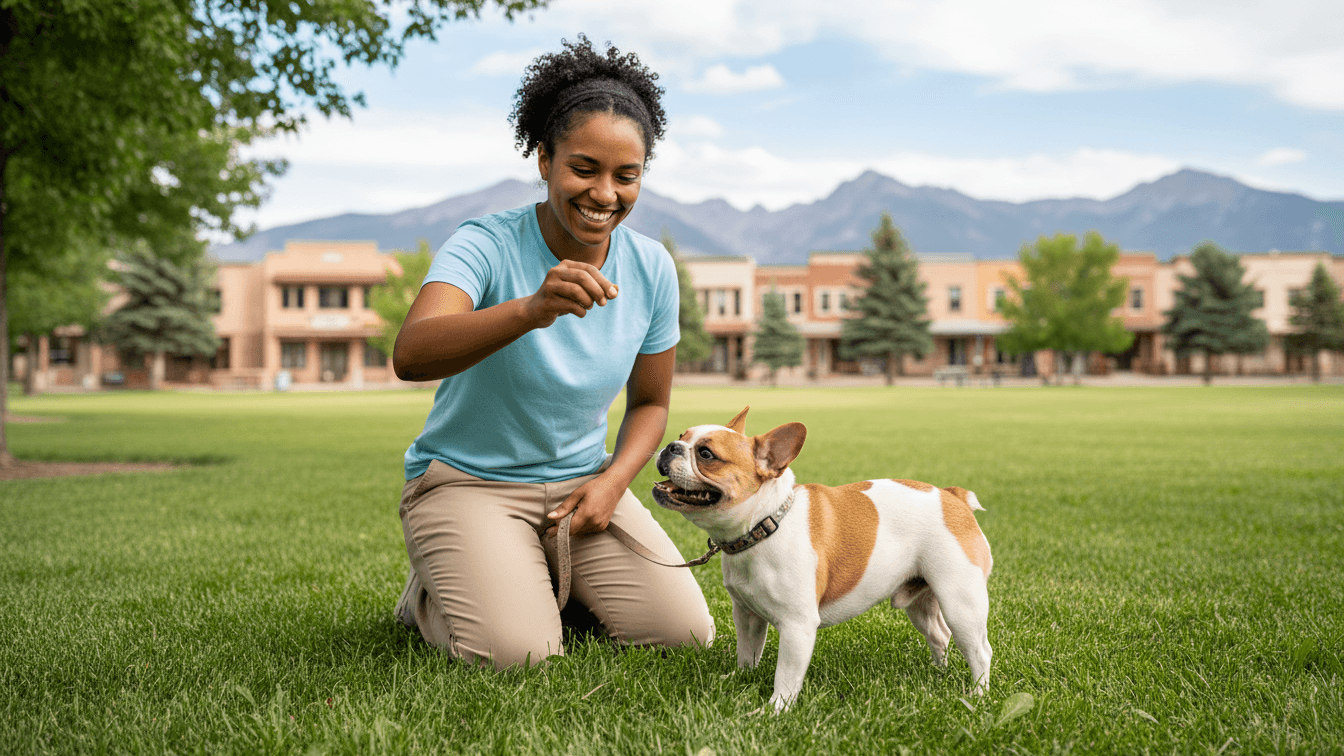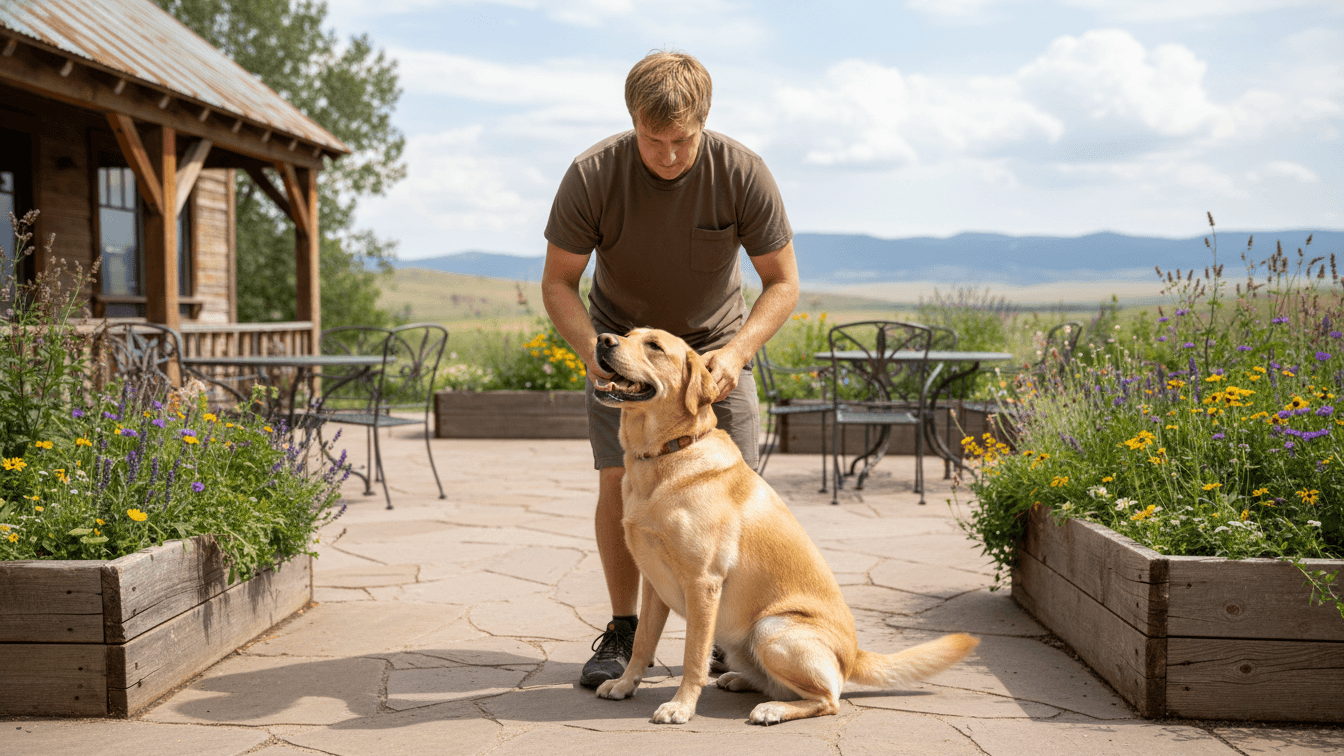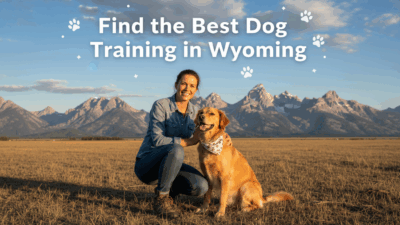Your Complete Guide to Choosing a Dog Trainer in Wyoming
Living in Wyoming means your dog needs to handle wide-open spaces, strong winds, unpredictable wildlife encounters, and long stretches between towns. Whether you’re in Cheyenne working on leash skills near the Capitol building, practicing recalls in Casper’s trails, or teaching your dog to stay calm around horses and cattle on rural properties, finding the right professional dog trainer makes all the difference.
Wyoming’s sparse population and vast distances mean you’ll want a trainer who understands the unique challenges of raising a well-behaved dog in this environment. Your dog might need to ride calmly in trucks for hours, ignore wandering deer and antelope, and behave reliably without fences or nearby neighbors to contain mistakes.
How to Choose the Right Trainer
Start by looking for someone who uses positive reinforcement training and understands Wyoming’s rural lifestyle. Your dog should learn reliable recalls across large properties, stay calm when livestock appear, and handle long car rides without stress.
Credentials give you a clear way to compare trainers’ experience levels. Common dog trainer certifications include KPA-CTP, CPDT-KA, or IAABC-CDBC for behavior problems. If your dog shows aggression toward livestock or wildlife, look for someone with CBCC-KA or a science-based program like CTC.
In-home dog training works especially well in Wyoming because trainers can address the exact situations you face daily, whether that’s door manners when ranch hands arrive, staying calm around horses, or handling the sound of gunshots during hunting season. Private lessons let you customize everything around your property and lifestyle.
Group classes can be harder to find outside larger towns, but they’re valuable once your dog can focus around distractions. These training sessions help prepare your dog for farmers markets, rodeos, and busy downtown areas.
Common Dog Training Methods Explained

Reward-based methods build the trust and reliability you need when your nearest neighbor might be miles away. These humane approaches also help you follow Wyoming’s animal welfare laws and keep your dog safe around livestock.
Basic obedience covers sit, down, stay, place, recall, and leash training so your dog can handle main street sidewalks, veterinary visits, and camping trips without pulling or jumping on strangers. Solid recall skills become especially important when your dog might encounter wildlife or wander onto neighboring property.
Puppy training focuses on socialization, potty training, bite control, crate comfort, and early leash skills. Starting young prevents problems before they develop, especially important when you’re raising a working dog or a companion who’ll spend time around livestock.
Behavior modification addresses fear, reactivity, resource guarding, or separation anxiety through careful desensitization and counterconditioning. Wyoming dogs often need help with livestock reactivity, gunshot sensitivity, or anxiety during windstorms. For serious cases, ask if your trainer works with local veterinarians.
Board and train programs can be helpful when you need faster results or lack the time for weekly sessions. Your dog stays with the trainer for intensive work, though you’ll still need follow-up coaching to maintain progress at home.
Dog training classes in larger Wyoming communities offer structured learning environments where dogs practice good manners around distractions. The best classes screen participants carefully and teach calm behavior rather than excitement.
Specialized training like service dog training or therapy dog training requires extra structure, public-access skills, and clear step-by-step programs. These programs take months to complete and demand consistency.
Stay away from trainers who use fear, intimidation, or pain to get results. Humane methods are safer for everyone, easier to maintain long-term, and far more reliable when your dog faces real-world decisions without you nearby.
Average Cost of Dog Training in Wyoming and Surrounding Areas (Updated for 2025)
Prices across Wyoming vary widely based on your location, the trainer’s experience, and how far they need to travel. Expect higher costs if you’re in remote areas where trainers must drive significant distances. Here’s what most Wyoming dog owners are paying in 2025.
| Service Type | Average Cost (Wyoming) |
|---|---|
| Puppy classes (4-6 weeks) | $175-$300 total |
| Group obedience classes (4-6 weeks) | $180-$325 total |
| Private lessons (60-90 min) | $125-$225 per session |
| In-home coaching packages (4-6 visits) | $500-$1,100 total |
| Day training (trainer works your dog) | $500-$1,000 per week |
| Behavior consult (initial) | $175-$275 |
| Board and train (2-4 weeks) | $2,200-$5,000 total |
You’ll likely pay travel fees if you live far from the trainer’s base location, especially in rural counties. Some trainers charge mileage or add flat travel rates for distances beyond 30 miles.
Make sure you understand what’s included in the total price, how the trainer measures progress, and whether they offer a free consultation before you commit to a training program.
Questions to Ask a Potential Dog Trainer
- What training methods do you use, and how do you keep sessions positive and low-stress?
- What credentials do you have, like KPA-CTP or CPDT-KA? Do you keep up with continuing education such as CPDT-KSA?
- Have you worked with dogs who need livestock awareness or wildlife desensitization?
- Do you offer in-home visits, and what’s your travel radius and fee structure?
- How will you customize the training plan for my dog’s specific needs and my Wyoming lifestyle?
- How will we measure progress and know when to add more distractions?
- What are the total costs, including travel fees, and what’s your cancellation policy?
- Do you carry liability insurance, and can you show me proof?
- For behavior problems, will you work with my veterinarian if needed?
- What should I practice between training sessions to help my dog keep improving?
Local Wyoming Rules and Considerations for Dog Owners
Wyoming leaves most animal control regulations to individual counties and municipalities, so rules vary depending on where you live. Understanding your local ordinances helps you avoid problems and keeps your dog safe.
Most Wyoming towns require leashes in public parks, on sidewalks, and in downtown areas. Cheyenne, Casper, Laramie, and other larger communities enforce leash laws in city limits, though enforcement and specific rules differ by location. Check with your city or county clerk’s office for exact requirements.
State law requires current rabies vaccination for all dogs over four months old, administered by a licensed veterinarian. You’ll need proof of vaccination and a valid rabies tag, which becomes important if your dog bites someone or gets impounded. The Wyoming Livestock Board oversees some animal health regulations, though most vaccination enforcement happens at the county level.
Wyoming doesn’t require general pet licenses statewide, but some cities and counties do. Cheyenne and Laramie both have licensing requirements, while many rural counties do not. Contact your local animal control office to confirm what applies to your area.
Barking and nuisance complaints are handled locally, and rules vary significantly. If you live on larger acreage, you’ll have more flexibility, but neighborhood dogs in town need to follow noise ordinances. Work with your trainer on alert barking and separation anxiety before complaints arise.
Wyoming has no state-level licensing requirements for dog trainers. Anyone can legally offer dog training services without special permits or certifications. This makes checking credentials and experience even more important when you’re choosing a trainer.
If a trainer operates a boarding facility as part of board and train programs, they may need to follow county health department rules or obtain business licenses, but requirements vary widely by location.
Local Wyoming Resources for Dog Owners
These locations give you great places to practice obedience training, work on socialization, and provide safe enrichment for your dog. Always follow posted rules and respect other users.
- Pioneer Park in Casper includes an off-leash dog area where you can practice recalls and work on greetings in a fenced space
- Cheyenne’s Jaycee Park Dog Park offers separate areas for large and small dogs with shade structures and water stations
- The Greater Cheyenne Greenway provides miles of paved trails for leash training and building focus around cyclists and other dogs
- Wyoming Game and Fish Department properties allow leashed dogs on many wildlife habitat areas and public access lands, perfect for controlled exposure to wildlife scents and distractions
Wyoming's national forests, BLM lands, and state parks welcome leashed dogs on most trails and in campgrounds, giving you endless opportunities to build reliable off-leash skills in controlled settings before testing them in true backcountry situations.

FAQs
How much does in-home dog training cost?
Most Wyoming trainers charge $125-$225 per in-home visit, with package discounts available when you book multiple sessions. Behavior problems typically cost more than basic puppy training. Expect additional travel fees if you live more than 30 miles from the trainer’s location.
Is in-home dog training worth it?
Absolutely, especially in Wyoming where your dog’s environment matters so much. Your trainer can address real-life challenges like staying calm when horses pass by, ignoring livestock in neighboring pastures, handling delivery trucks on long driveways, and staying quiet during windstorms. Working where problems actually happen speeds up results.
Can you pay someone to house train your dog?
Yes, many expert dog trainers offer puppy training programs that include potty training, crate routines, and daily schedules. Day training or board and train options can speed up the process while teaching you how to maintain the progress once your puppy comes home.
What is the 3-3-3 rule for dog training?
This guideline helps with new or adopted dogs: expect about 3 days for your dog to decompress, 3 weeks to learn your routines, and 3 months to feel completely settled. Good training programs work with this natural adjustment period rather than pushing too hard too soon.
How long will it take to reach my training goals?
Most puppies and friendly adult dogs show solid progress within 4-8 weeks if you practice daily. Fear, reactivity toward livestock or wildlife, or aggression typically requires several months of careful behavior modification with gradual increases in difficulty. Wyoming’s wide-open spaces can actually help because you have room to work at safe distances.
What should I bring to group classes?
Pack a flat collar or harness, a 6-foot leash, high-value treats, water, and current vaccination records if your trainer requests them. Leave retractable leashes at home for safety reasons. Bring a mat or towel if the trainer uses place training.
What’s the leash law in Wyoming?
Leash laws vary by city and county. Most Wyoming towns require leashes in public parks, on sidewalks, and in downtown areas. Cheyenne, Casper, Laramie, and other communities enforce leash requirements within city limits. Rural areas outside city boundaries often have no leash laws, but you’re still responsible for keeping your dog under control and preventing it from harassing livestock or wildlife.
Do I need a dog license in Wyoming?
Wyoming has no statewide dog license requirement, but some cities and counties do require them. Cheyenne and Laramie both have licensing programs. Contact your city clerk or county animal control office to find out what applies where you live.
What shots does my dog need in Wyoming?
Wyoming requires rabies vaccination for all dogs over four months old. Your veterinarian will provide a certificate and tag after vaccination. Most vets also recommend distemper-parvo combination vaccines and bordetella based on your dog’s lifestyle. If you board your dog or attend training classes, those facilities may require additional vaccines.
Are dog trainers required to be licensed in Wyoming?
No. Wyoming has no state licensing or certification requirements for dog trainers. Anyone can legally offer dog training services without special permits or credentials. This makes it especially important to check for professional certifications like CPDT-KA or KPA-CTP and verify experience when choosing a certified dog trainer.
Where can I practice off-leash recall?
Fenced dog parks in Casper and Cheyenne offer safe spaces for off-leash practice. For more advanced training, Wyoming’s vast BLM lands, national forests, and wildlife habitat areas allow dogs under voice control in many locations. Start in fenced areas, then progress to long-line training in open spaces before trusting full off-leash freedom around wildlife and livestock.
Which dog parks allow training around Wyoming?
Pioneer Park in Casper and Jaycee Park Dog Park in Cheyenne both allow training inside their fenced off-leash areas. Visit during quieter morning hours when you’re starting out. Most parks don’t allow formal training classes without permission, but individual practice with your own dog is welcome.
What trails allow dogs for training?
The Greater Cheyenne Greenway welcomes leashed dogs and provides excellent settings for leash training and impulse control around bikes and joggers. Wyoming’s national forests, including Medicine Bow-Routt and Bridger-Teton, allow leashed dogs on most trails. These areas give you perfect opportunities to build focus around wildlife, other hikers, and challenging terrain. Always check specific trail regulations before visiting.
How do I help my dog with livestock reactivity?
Many Wyoming dogs struggle with staying calm around horses, cattle, and sheep. Work with a trainer experienced in behavior modification who can create a careful desensitization plan. Start at distances where your dog notices livestock but can still focus on you, then gradually decrease distance over many sessions as your dog learns calm behavior gets rewarded.
What if I live hours from the nearest trainer?
Distance is a common challenge in Wyoming. Look for trainers who offer video consultations, extended day-long intensives, or board and train programs where your dog stays with them for focused work. Some trainers will travel long distances if you’re willing to pay mileage and commit to multiple sessions in one trip.
Finding the right dog training services in Wyoming takes extra effort because of the state’s size and sparse population, but the payoff is a confident, reliable companion who can handle everything from downtown Sheridan to remote backcountry trails. Whether you need help with basic obedience, aggressive dog training, or teaching your top dog to ignore wandering antelope, look for trainers who understand Wyoming’s unique environment and use humane, science-based methods.
